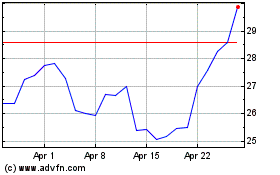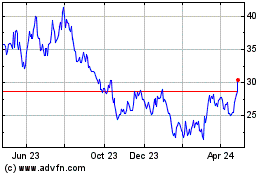Wal-Mart Alters China Strategy, Taking a Partner -- WSJ
June 21 2016 - 3:05AM
Dow Jones News
By Rick Carew, Alyssa Abkowitz and Sarah Nassauer
Wal-Mart Stores Inc. is switching strategies in China, striking
a deal to forge a partnership with one of the country's largest
e-commerce players rather than continue trying to crack the
fast-growing but competitive market on its own.
Wal-Mart on Monday said it will sell its Yihaodian website to
JD.com Inc. -- the second-largest online retailer in China, after
Alibaba Group Holding Ltd. U.S.-based Wal-Mart will receive a 5%
stake in JD.com, valued at roughly $1.5 billion at recent prices,
and access to JD.com's delivery network and shoppers.
JD.com American depositary shares rose 4.6% to $21.06 on the
Nasdaq Stock Market amid the news, which was reported earlier by
The Wall Street Journal. Wal-Mart shares rose slightly to $71.10 on
the New York Stock Exchange.
The Chinese retail landscape has become cutthroat as the economy
slows and consumer buying behavior shifts online and to
mobile-phone purchases much faster than in the U.S. JD.com and
Alibaba are battling for customers, promising delivery in under an
hour in some cities and pushing into rural towns.
Wal-Mart has struggled to expand in the country, even though it
gets about one-third of its $482.1 billion in annual sales outside
the U.S. The retailer opened its first store in China in 1996 but
only has about 430 there today, or one-tenth as many as in the U.S.
Foot traffic to Wal-Mart's Chinese stores has fallen for nine
quarters straight, though spending per trip is on the rise.
The retailer first invested in Yihaodian in 2012 and took full
control of the business last year. The website has built a niche in
grocery sales but accounts for just 1.5% of China's retail
e-commerce market, according to data from consulting firm
iResearch. JD.com and Alibaba together command about 80% of the
market.
"We have seen high-quality U.S. retailers go into China and not
be that successful," said Charlie O'Shea, Moody's lead retail
analyst. Joining with JD.com "gives Wal-Mart an entree into China
that will be tough for it to do on its own," he said.
The sale allows Wal-Mart to quickly ramp up online sales
nationally in China, said Dan Toporek, a spokesman. Yihaodian is
strong in southern and eastern China, he said, but JD.com "vastly
expands our reach to a much broader set of customers in China and
also provides a physical network for delivery."
As part of the deal, Wal-Mart is giving up its right to start a
new Chinese website, but can continue to operate its local Wal-Mart
and Sam's Club apps and websites, according to financial filings.
The company expects the transaction to boost earnings by a range of
16 cents to 19 cents a share in the current quarter.
Wal-Mart said in July last year that it had taken full control
of Yihaodian from its minority partner, paying $760 million for the
49% stake it didn't already own. Wal-Mart executives have said they
want to move faster to grab a larger piece of the expanding online
and mobile Chinese shopping market, slowing the growth of their
store expansion in the country.
JD.com, like Wal-Mart, has focused on selling directly to
consumers. It has tried to expand its offerings as it competes with
the larger Alibaba, which operates consumer-to-consumer website
Taobao and merchant-to-consumer online marketplace Tmall. Unlike
Alibaba, JD.com has largely built out its own logistics network,
including dozens of warehouses and tens of thousands of delivery
workers.
JD.com has been chipping away at Alibaba's market share, and its
revenue growth has outpaced Alibaba for the past seven quarters.
Still, its market share in sales of products online to consumers is
about 23%, compared with TMall's 58%, according to data from
consulting firm iResearch.
Competition has heated up in Yihaodian's grocery niche as local
Chinese retailers have gone online and many startups have entered
the field to sell things as diverse as imported avocados and
dishwashing detergent. The deal will help JD.com broaden its
selection of imported products using Wal-Mart's supply chain, said
Mr. Toporek, the Wal-Mart spokesman.
JD.com has bolstered its food offerings, for example, through
its investment in FruitDay, a Chinese online produce retailer, and
is expanding imports, including signing deals with Australian milk
companies and U.S. meat and vegetable producers.
Morgan Stanley advised Wal-Mart on the latest deal, while JD.com
didn't have a financial adviser.
--Juro Osawa contributed to this article.
Write to Rick Carew at rick.carew@wsj.com, Alyssa Abkowitz at
alyssa.abkowitz@wsj.com and Sarah Nassauer at
sarah.nassauer@wsj.com
(END) Dow Jones Newswires
June 21, 2016 02:50 ET (06:50 GMT)
Copyright (c) 2016 Dow Jones & Company, Inc.
JD com (NASDAQ:JD)
Historical Stock Chart
From Jun 2024 to Jul 2024

JD com (NASDAQ:JD)
Historical Stock Chart
From Jul 2023 to Jul 2024
